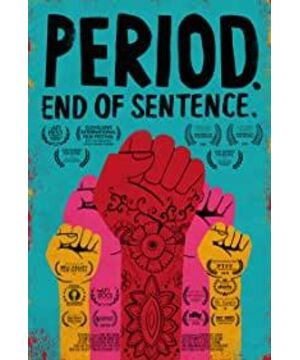On April 5, 2018, a "rough" documentary of less than 26 minutes was screened at the Cleveland Film Festival. No one thought that a year later, this documentary called "Lunar Revolution" won the 91st Academy Awards (2019) for Best Documentary Short Film.
This is a documentary about menstruation and sanitary napkins. The film is about a group of women in Delhi, India, fighting for the right to obtain sanitary napkins for themselves and all women.
Few people know that menstruation is one of the biggest taboos in India. Women cannot talk openly or use sanitary napkins. Even in a country as big as India, less than 10% of women use sanitary napkins. They are not unable to afford it, but in a patriarchal society, menstrual affairs are regarded as unclean or disease. Women who have come to the moon can not enter the temple because it is regarded as a blasphemy against the gods. The women secretly went out in the dark and buried the used cloth into the soil because they didn't know how to deal with this filthy product. There are even girls who have to choose to drop out of school because of menstruation, because they can’t find a place to change the sanitary napkins, and unkind men are everywhere...
Of course, this involves another bad practice in India, as we can see from the 2017 movie "Toilet Revolution" starring Amir Khan.
In India, very few families have toilets. Because in the concept of the locals, no one would want to leave the filth at home. So this has led to the fact that in India, it is something to be proud of. But men can do it anywhere, what about women? The women were forced to form a relief organization and walked dozens of miles in the middle of the night to an untouched wilderness and squat for convenience. If you are unlucky, you will encounter nasty but blatant "voyeurism" of malicious hooligans, without any privacy at all.
Even the most basic knowledge of physiological hygiene is still unknown to many people in India.
At the beginning of the film, the documentary filmmaker asked a group of girls, "What is menstruation?" The girls shoved each other and were unwilling to answer, and in the end they could only prevaricate this question with a shy smile. Even the older woman in the village would say, "This is something that only God knows." And what flows out of his body is bad blood, something that makes people feel ashamed. There are also girls who said that she only knows that only when menstruation come can they have a baby. But is the meaning of menstruation itself really just like this?
Of course, the boys don't care about this issue, after all, it has no direct interest relationship with them. Even in this documentary, I heard a boy say this: "Menstruation? Is it the kind of bell ringing during school hours?"
But even in such an environment that is extremely unfriendly to women, I still see girls starting to use their own hands to make what they really need, and they are investing in the production and sales of sanitary napkins. Moreover, the girls also named the sanitary napkins they made, "Flying". And the girls in the documentary. Optimistic and positive attitude towards life also deeply moved me. Even before that, my impression of India was really not good.
A country where patriarchal customs are deeply rooted and almost obliterate the health and self-esteem of most women. A country where 53% of children in the country were victims of child sexual assault. It is really hard for me to imagine the girls in India. How much effort will it take to achieve a real class leap. Of course, this once traditional, backward, and feudal country is gradually changing.
From "Wrestling!" "Dad" encourages women to be brave to be themselves, not to be confined in a tight room; then to "Toilet Hero" and "Indian Partner" to seek more rights for women; and in the documentary "Moon Affairs Revolution", from the very beginning Everyone talks about menstrual discoloration until the end. Some men have also begun to participate in the production of sanitary napkins, and the Indian government officially announced the abolition of the 12% consumption tax on sanitary napkins on July 21, 2018. This is because this country is struggling. Efforts to explore and try towards civilization and true equality between men and women.
Then we look back at ourselves. Of course, in China, women's social status and family status are still much higher than that of India. At the very least, we can openly buy the sanitary napkins we need in supermarkets and shopping malls. Moreover, according to the survey data at the end of 2017, the use rate of female sanitary napkins in my country is far higher than that of India, and even comparable to developed countries such as Europe and the United States. Because as of 2016, the market penetration rate of sanitary napkins in my country has reached 96.5%, and in recent years, the age group of sanitary napkins used by women of the right age has also extended to both ends. In the future, the market scale of sanitary napkins in China will further expand. But true equality between men and women is not only reflected in the use rate of sanitary napkins.
The World Economic Forum publishes the "Global Gender Gap Report" once a year, trying to analyze and quantify the status of women in various countries from the four fields of economy, education, politics, and health. The regression of gender equality in China began in 2011, and the global ranking of the gender gap between men and women has been declining since 2011.
2011, world ranking 61; 2012, world ranking 69; 2013, world ranking 69; 2014, world ranking 87; 2015, world ranking 91; 2016, world ranking 99; 2017, world ranking 100; 2018, world ranking 103.
In 8 years, there are a total of 224 countries and regions in the world, and China has dropped from 61 in 2011 to 103. What does this mean? This not only shows that the situation of equality between men and women in our country is getting more and more serious, but also shows that we still have a long way to go if we want to achieve true equality between men and women.
Of course, I also hope that Chinese women, no matter where they come from, whether they are poor or rich, everyone can work hard to step out of their comfort zone and work hard for their future lives. I also hope that this society can give women more opportunities and a more tolerant living environment, not just forcing the false prosperity of "women can hold half of the sky" for the benefit of the holidays. After all, the country will be strong only if women are strong, mothers are strong, and sisters are strong.
View more about Period. End of Sentence. reviews






